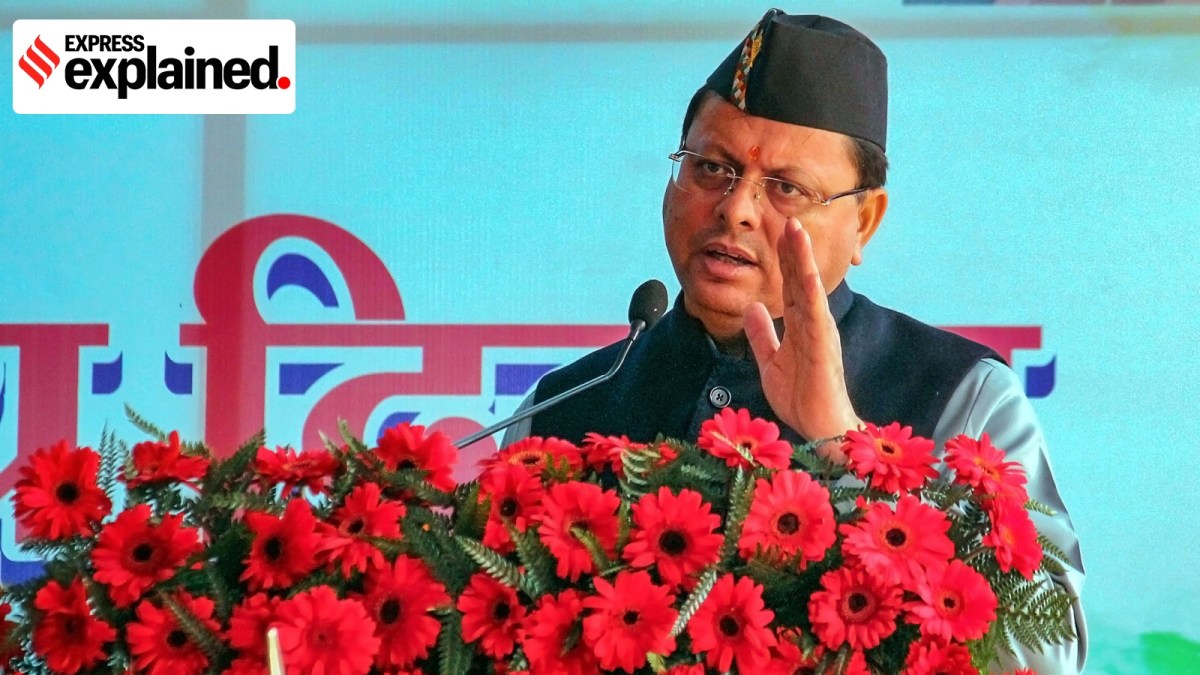Uttarakhand CM forms panel to examine 2022 land law committee report: What is the issue — and what did the report say
Several social organisations recently organised a rally in Dehradun, demanding a stricter land law to curb the large-scale sale of land to “outsiders”. The organisations also demanded for raising the minimum number of years required for non-Uttarakhand residents to get domicile certificates.

Uttarakhand Chief Minister Pushkar Singh Dhami, a few days back, formed a five-member committee for a detailed study of a 2022 draft report that gave recommendations for amending the state’s land laws.
This comes days after several social organisations announced a rally (organised on Sunday) in Dehradun, demanding a stricter land law to curb the large-scale sale of land to “outsiders”. The organisations also demanded for raising the minimum number of years required for non-Uttarakhand residents to get domicile certificates. They have claimed that “outsiders” easily getting domicile certificates is risking the future of the children of those who fought for a separate state.
Here is a look at the issue and what the 2022 report said.
The spark
In 2003, then Chief Minister ND Tiwari (from the Congress party) introduced the first-ever limit on land purchases in the hilly areas of the state by non Uttarakhand residents. He brought in two amendments to existing land laws that capped land purchases at 500 square metres. The move aimed to preserve local identity, while also focusing on inviting investments from outside. Subsequently, under the BJP-led government of BC Khanduri, this limit was reduced to 250 square metres.
Troubles, however, began in 2017, when then CM Trivendra Rawat (from the BJP) lifted these restrictions entirely after an investor’s summit. Rawat said this would stimulate investments in the hills, and help foster economic progress. The liberalisation was more pronounced in municipal areas, where “outsiders” faced no constraints in land acquisition.
This triggered a wave of discontentment among locals. As more land was bought by the “outsiders”, Uttarakhand residents got concerned about preserving their own culture, and demanded the reinstatement of strict regulations — a 250 square metre cap in municipal areas, and a complete ban on rural land sales.
Responding to the mounting pressure, BJP’s Pushkar Singh Dhami formed a high-level panel to examine Uttarakhand’s land laws, a month after being appointed the Chief Minister in 2021.
The committee’s recommendations
The committee, headed by ex-chief secretary Subhash Kumar, submitted its report with 23 recommendations. It recommended that, unlike the current practice, the approval for the purchase of farmland should come from the government rather than from district magistrates.
Talking to The Indian Express, Subhash Kumar said the most important recommendation was the introduction of an ‘essentiality certificate’ just like Himachal Pradesh where it is an important requirement for non-agriculturists, or non-residents who wish to purchase land in the state.
As per the rules in Himachal Pradesh, an essentiality certificate is issued by the state government, verifying the “essentiality” or necessity of the purchase of land by a non-agriculturist or non-resident. Authorities examine the application to ascertain if the purchase is indeed essential for the applicant.
The committee also recommended strict action against those building illegal structures or religious places on rivers, forest areas, pastures, or public land. There should be a state-wide campaign against illegal possession of lands, it said.
In its 80-page report, the committee said that at present, district magistrates allow the purchase of farmland for related purposes, but in several cases, the land is misused by the construction of resorts or personnel bungalows on it. This is making the hill residents landless and is not creating new jobs, it added.
In August 2023, Dhami said that the government is fully prepared and committed to implementing the land law, and informed that this proposal will be put up in the cabinet meeting soon. The recommendations, however, are yet to be implemented.
Instead, the Uttarakhand government has now formed a five-member committee for a detailed study of the report submitted by the panel.